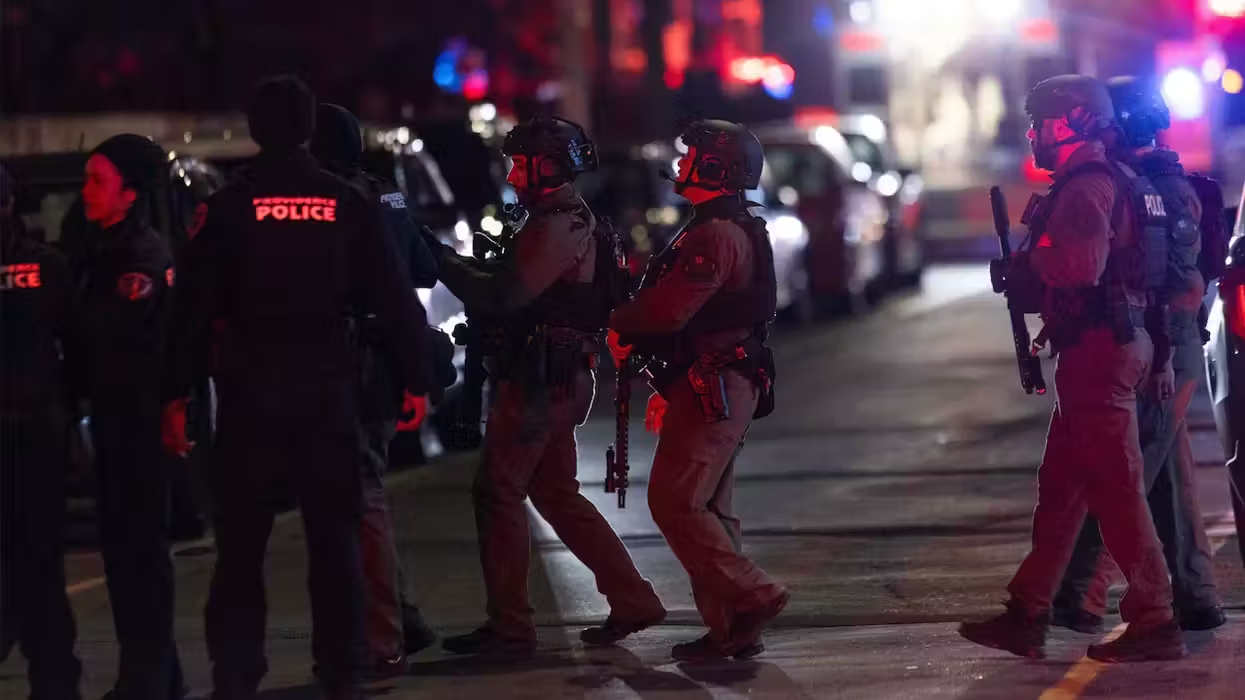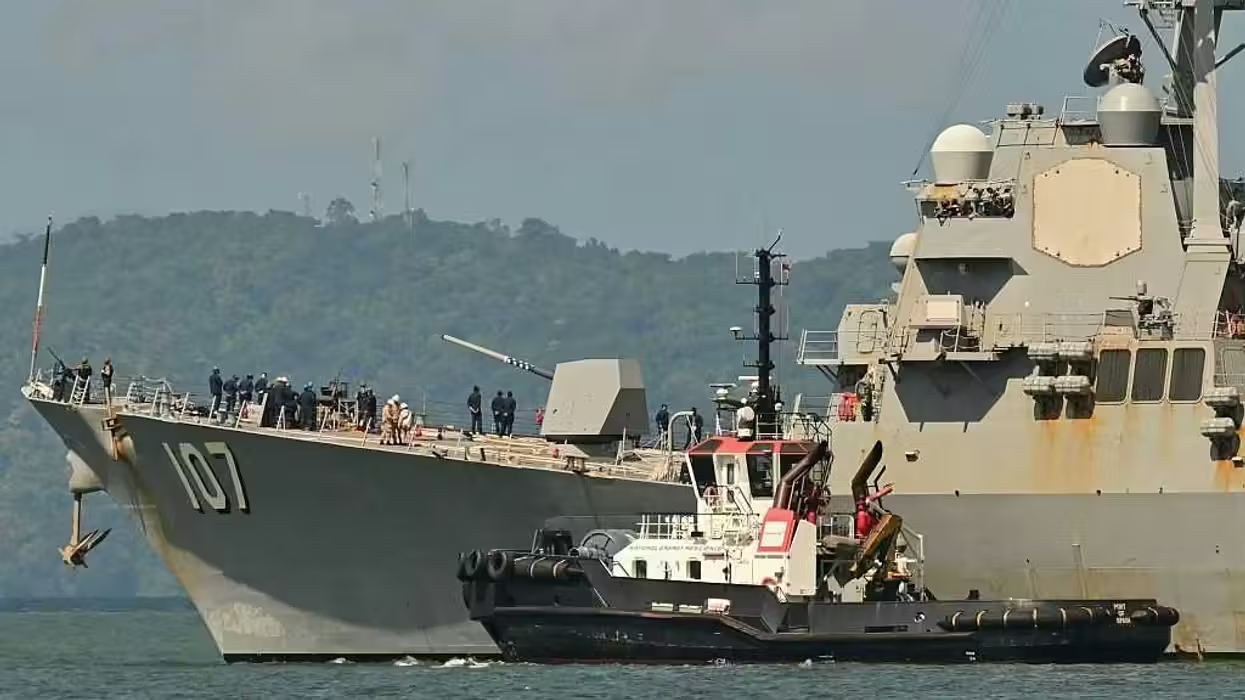The world watched in horror as jihadist terrorists swept across large swathes of Iraq last week. The Islamic State of Iraq and Syria ("Sham"), referred to as ISIS, launched a bold jihadist invasion, seizing substantial war spoils and reportedly executing large numbers of captured soldiers.
There is panicked talk of Iraq as a failed state (probably there already), a Sunni Jihadist Caliphate forming (perhaps, though taking control and keeping it are not the same thing) and even the remote prospect of all this leading to a massive civil war between the two main sects of Islam — Sunni and Shia — with Iraq as the battleground and every Muslim country in the region backing its preferred faction (that would be really, really bad).
 In this Monday, April 28, 2014 file photo, masked anti-government gunmen move with their weapons as they patrol in Fallujah, Iraq. (AP Photo, File)
In this Monday, April 28, 2014 file photo, masked anti-government gunmen move with their weapons as they patrol in Fallujah, Iraq. (AP Photo, File)
The situation in Iraq is a disaster. With every passing day, the facts on the ground change, sometimes dramatically, but there are some major trajectories that must be identified now if the Obama administration is going to have any hope of adopting a decent strategy to help contain the crisis.
So here's what's going to happen in Iraq next, if history and current trends are any indicator:
1) BAGHDAD WILL HOLD, BUT IT WILL BE UGLY
The Iraqi government knows that Baghdad must be held at all costs, and it has the capability to do so.
ISIS got in a good punch in the North at the start of hostilities, but the fighting gets harder the further South the Al Qaeda-aligned terrorists go. The ISIS insurgent blitzkrieg routed the ill-prepared Iraqi army temporarily, but those were in Sunni Arab majority areas where ISIS could count on some degree of sectarian sympathy (or at least indifference) and face-off against army units that weren't motivated enough to fight.
There are other forces in the country, though, who won't give ground so easily. The taking of Mosul showed us Iraqi army and police units deserting in droves — but the more Kurdish-controlled east of Mosul was largely untouched. That's because the Kurdish militia called the "Peshmerga," (which means "those who confront death") were waiting on the other bank of the Tigris river. The Pesh don't mess around, and ISIS didn't want a real fight. That's an important lesson for anyone watching Iraq now.
Of course, the best Iraqi troops are in and around the capital city of Baghdad (a common arrangement in countries at particular risk for a coup or civil war). The majority Shia population there will fight tooth and nail to keep control of the largest and most important urban center in the country. There is also the prospect of renewed sectarian violence as a motivator.
In addition to its anti-Coalition attacks, the Jaysh al-Mahdi, a Shia militant group, engaged in ethnic cleansing of Sunnis starting in 2006 in response to targeting of Shia civilians. While JAM disarmed years ago, that same tit-for-tat sectarian ferocity is fresh in the minds of the Iraqi population, which is why throngs of civilians young and old have volunteered to fight for the Iraqi government this past week.
 Iraqi army troops chant slogans against the Islamic State of Iraq and the Levant (ISIL) as they recruit volunteers to join the fight against a major offensive by the jihadist group in northern Iraq, outside a recruiting centre in the capital Baghdad on June 13, 2014. (ALI AL-SAADI/AFP/Getty Images)
Iraqi army troops chant slogans against the Islamic State of Iraq and the Levant (ISIL) as they recruit volunteers to join the fight against a major offensive by the jihadist group in northern Iraq, outside a recruiting centre in the capital Baghdad on June 13, 2014. (ALI AL-SAADI/AFP/Getty Images)
As for the U.S. Embassy, Despite the breathless headlines, it almost certain it will not be totally evacuated. The Embassy facility is a massive fortress containing thousands of personnel and specifically intended to withstand attacks like car bombings and Indirect Fire (IDF) from mortars and rockets. Embassy Baghdad cost Uncle Sam an estimated $750 million. There is almost no circumstance under which we would abandon our largest diplomatic post in the world.
That said, expect ISIS to conduct a series of spectacular suicide bombing attacks and other strikes inside the capital intended to sow fear and chaos for the days and weeks ahead. For the jihadists, making life miserable in Baghdad and causing daily carnage keeps the central government off-balance and makes Prime Minister Maliki look weak. And there is very little the Iraqi national security forces can do to prevent shootings, kidnappings, and bombings in a city of 8 million people. Misery is a certainty for the city of Baghdad.
2) IRAQI ARMY WILL SLOWLY RETAKE LOST TERRITORY, WITH U.S. HELP
Holding the line at Baghdad is just a start to the anti-ISIS campaign. Once the advance of the Sunni Jihadists is stopped, the next step will be taking back Tikrit, Mosul,Tal Afar, Fallujah, and other towns and areas where the black banners of jihad currently fly. This will not be easy. It will take weeks at best, probably more like months, possibly years.
Yes, billions of dollars and countless American military man-hours have been spent trying to train the Iraqi military. We saw the limits to those efforts when some of those Iraqis considerately folded their uniforms and neatly laid them alongside their weapons for the ISIS marauders to loot. Iraq's security forces have gaping deficiencies, particularly on intelligence and logistical matters, and can call upon only limited air attack capabilities.
Additionally, jihadist insurgents don't have to win, they just have to prevent the central government from winning. While ISIS does like to parade around in pick-up truck convoys and and shout over loud speakers about Shariah law, they do not have to openly hold territory to be debilitating for the government in Baghdad.
 This undated file image posted on a militant website on Tuesday, Jan. 14, 2014 shows fighters from the al-Qaida linked Islamic State of Iraq and the Levant (ISIL) marching in Raqqa, Syria. (AP Photo/militant website, File)
This undated file image posted on a militant website on Tuesday, Jan. 14, 2014 shows fighters from the al-Qaida linked Islamic State of Iraq and the Levant (ISIL) marching in Raqqa, Syria. (AP Photo/militant website, File)
Their most likely response to the inevitable Iraqi army counteroffensive will be to melt away into the civilian population, and engage in repeated, continuous guerrilla and terrorist attacks. This will cause overreactions from Iraqi soldiers and sectarian reprisals. In turn, ISIS will claim the mantle of "defender of the Sunni" from these attacks.
A slow, grinding, bloody campaign to reestablish Baghdad's control of the North is very likely.
3) SUNNI JIHADIST INSURGENCY WILL RAGE ON
The Iraqi government has to both defend the population and go on the offensive against the insurgency. This is a difficult task for even the most capable military, as history has shown time and again.
Remember, the U.S. and Coalition forces fought ferociously against Al Qaeda in Iraq (AQI, an earlier iteration of the same Sunni Jihadist phenomenon currently running amok) to quell the insurgents. It took an additional surge of U.S. troops, a new approach to counterinsurgency, and a widespread uprising of the Sunni Arab population to turn the tide in 2008-2009.
Since the pullout of American troops in 2011, Iraq doesn't have the best military in the history of the world to back it up anymore — far from it. If, as President Obama has indicated, this is really going to be Iraq's fight alone, then casualties will mount for months and Iraq's economy and political system will suffer dramatically along the way.
Even if the Iraqi army manages to exceed all expectations, eradicating ISIS will be essentially impossible. The terrorist group currently spans the Iraq-Syria border, which means that even if it is pushed out of all sovereign Iraqi territory, it can find safe haven on the Syrian side. A similar dynamic exists in Afghanistan-Pakistan, as no matter how effective U.S. troops have been in degrading the Taliban's fighting capabilities, there will always be more fighters recruited, trained and deployed from the Pakistani side of the border.
In short: Syria is now to Iraq as Pakistan is to Afghanistan when it comes to harboring terrorist groups.
4) SECTARIAN SUNNI-SHIA DIVIDE WILL WORSEN
While ISIS will have a tough time holding territory and governing it as a Caliphate, it can still ignite a massive sectarian bloodletting. Hatred between Sunni and Shia in Iraq has already led to countless violent, vicious outbursts in the past. When AQI bombed the Golden mosque in Samaraa in 2006, for example, it sparked a cycle of religious violence that almost ripped the country apart.
 Iraqi families fleeing violence in the northern Nineveh province gather at a Kurdish checkpoint in Aski kalak, 40 kms West of Arbil, in the autonomous Kurdistan region, on June 10, 2014. (Photo: Safin Hamed/AFP/Getty Images)
Iraqi families fleeing violence in the northern Nineveh province gather at a Kurdish checkpoint in Aski kalak, 40 kms West of Arbil, in the autonomous Kurdistan region, on June 10, 2014. (Photo: Safin Hamed/AFP/Getty Images)
Expect a similar effort soon from ISIS. If the Jihadists are pushed out of the areas they have recently taken, they will switch from trying to set up a Caliphate to igniting an all out Sunni-Shia civil war. If they are successful, the whole Middle East could be brought into the conflagration in some capacity.
The long-term ramifications of such a conflict are impossible to estimate beyond the horrific cost in lives and the realization that the Middle East would have been lost under President Obama's watch.
Bottom line: even the best case scenarios for Iraq look pretty awful.

 In this Monday, April 28, 2014 file photo, masked anti-government gunmen move with their weapons as they patrol in Fallujah, Iraq. (AP Photo, File)
In this Monday, April 28, 2014 file photo, masked anti-government gunmen move with their weapons as they patrol in Fallujah, Iraq. (AP Photo, File)






